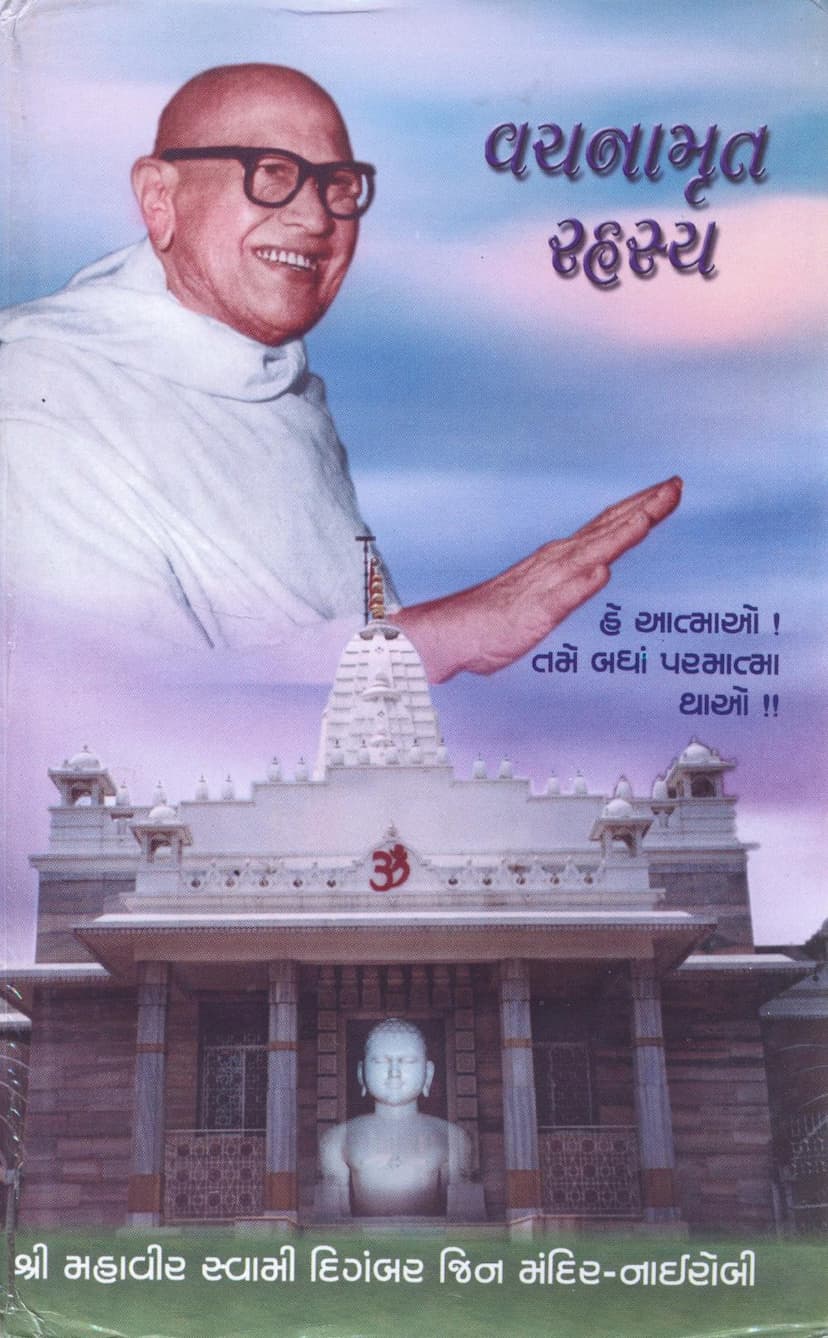Vachnamrut Rahasya
Added to library: September 2, 2025

Summary
Here's a comprehensive summary of the Jain text "Vachnamrut Rahasya" by Vitrag Sat Sahitya Prasarak Trust, based on the provided pages:
Book Title: Vachnamrut Rahasya (Vachanamrut Rahasya) Author(s): Based on the discourses of Pujya Gurudevshri Kanjiswami, compiled by Vitrag Sat Sahitya Prasarak Trust. Publisher: Vitrag Sat Sahitya Prasarak Trust, Bhavnagar. Catalog Link: https://jainqq.org/explore/007160/1
Overall Purpose: This book, "Vachnamrut Rahasya," is a collection of profound spiritual discourses delivered by Pujya Gurudevshri Kanjiswami. These teachings are based on the profound spiritual insights and experiences of Pujya Bahenshri Champaben. The primary aim of the book is to guide the seeker (mumukshu) on the true path of liberation (moksha) by elucidating the essence of the Jain path of non-attachment (Vitraag Jinmarg).
Key Themes and Content:
The book is essentially a compilation of "Vachanamrut" (nectar-like words) from Pujya Gurudevshri Kanjiswami's discourses, specifically those given in Nairobi in response to a request to elaborate on the spiritual experiences and teachings of Pujya Bahenshri Champaben.
-
Pujya Gurudevshri Kanjiswami's Contribution: The text highlights Gurudevshri's immense knowledge, extraordinary talent, deep understanding of subtle scriptural principles, compassionate heart, and unwavering devotion to the Jinmarg. His discourses are described as a "rain of nectar" that guides souls towards liberation.
-
Pujya Bahenshri Champaben's Spiritual State: A significant focus of the discourses is on Pujya Bahenshri Champaben. Gurudevshri deeply praises her spiritual state, highlighting her profound inner experiences, her recollection of past lives (jati-smaran-gyan), and her deep connection to the Vitraag Jinmarg. Her words are considered truly like nectar for seekers.
-
The Nature of the Soul and Liberation: The core message revolves around understanding the true nature of the soul (Atma) as pure consciousness, knowledge, and bliss. The teachings emphasize that true happiness and liberation are found within the soul, not in external worldly pursuits.
- The soul is inherently pure, formless, and beyond worldly attachments.
- Worldly pleasures and possessions are temporary and ultimately lead to suffering.
- The path to liberation involves turning the focus inward, cultivating detachment from external objects and experiences, and realizing the soul's true, unadulterated nature.
-
The Path of Self-Realization: The book stresses the importance of self-inquiry and direct experience (anubhav) of the soul.
- The First Step: Turning Inward: A crucial point made early in the text is that if one is dissatisfied with anything in the world, they should turn their attention inward to the soul, as only the soul contains true contentment and bliss.
- The Power of Self-Inquiry: The teachings encourage deep contemplation and investigation into the nature of the soul, emphasizing that true understanding comes from introspection rather than external rituals alone.
- Effort and Devotion: The importance of continuous effort (purusharth) and unwavering devotion (shraddha) to the path of self-realization is highlighted.
-
Key Spiritual Concepts Discussed:
- "He Jiv!": The discourses often address the soul directly, emphasizing its inherent divinity.
- "Ahankara Jato Rahyo...": The process of shedding ego and attachments is discussed.
- "Jiv Ekalo Chhe": The solitary nature of the soul in its journey of birth, death, and eventual liberation.
- "Gnan Matra Chhu": The soul's true nature as pure knowledge.
- "Anubhav": The direct experience of the soul's bliss and consciousness, described as the first step of true religion (Samya-darshan).
- "Aatm-Lagni": The burning desire and yearning for the soul.
- "Jnani ni Parinathi": The natural and effortless state of enlightened beings.
- "Gnan ane Vairagya": The complementary roles of knowledge and detachment.
- "Upayog Paltaav": The redirection of consciousness inward.
- "Nij Ghar": The soul's true home within.
- "Kashay Nu Bal": The power of passions (kashayas) and the need to overcome them.
- "Manushya Bhav": The preciousness and fleeting nature of human existence, emphasizing the opportunity for spiritual progress.
- "Nirvikalp Samadhi": The state of undisturbed, selfless consciousness.
- "Shraddha": The fundamental importance of faith and conviction in the path.
- "Shraddha Anusayi Virya": The effort aligned with faith.
- "Samayantar": The concept of time and the soul's eternal nature.
- "Nitya Anant Anand": The eternal bliss of the soul.
- "Bhedgyan": Discernment between the soul and non-soul (pudgala).
- "Dravya-Drishti": Seeing things from the perspective of their fundamental, eternal substance.
- "Nishchay Naya": The ultimate truth, as opposed to conventional understanding.
- "Vachanamrut": The nectar-like quality of the teachings.
-
Methodology of Compilation: The discourses were originally recorded on video and audio cassettes. These were then transcribed accurately, cross-referenced with the audio for any errors, and meticulously edited to ensure faithfulness to Gurudevshri's words.
-
Target Audience: The book is intended for all sincere seekers (mumukshu jiva) who aspire to achieve liberation and understand the true path of Jainism.
Significance and Impact: The book aims to provide deep spiritual understanding and practical guidance for those on the path to self-realization. It offers insights into the subtle workings of the soul and the steps required to overcome worldly attachments and attain eternal bliss. The teachings are presented in a way that can be understood and applied by sincere aspirants, leading them towards the ultimate goal of liberation. The wide dissemination of the book (60,000 copies mentioned) indicates its significant impact in spreading spiritual knowledge.
In essence, "Vachnamrut Rahasya" is a spiritual treasure trove, offering the timeless wisdom of Jain philosophy through the profound and accessible words of Pujya Gurudevshri Kanjiswami, inspired by the inner realization of Pujya Bahenshri Champaben.